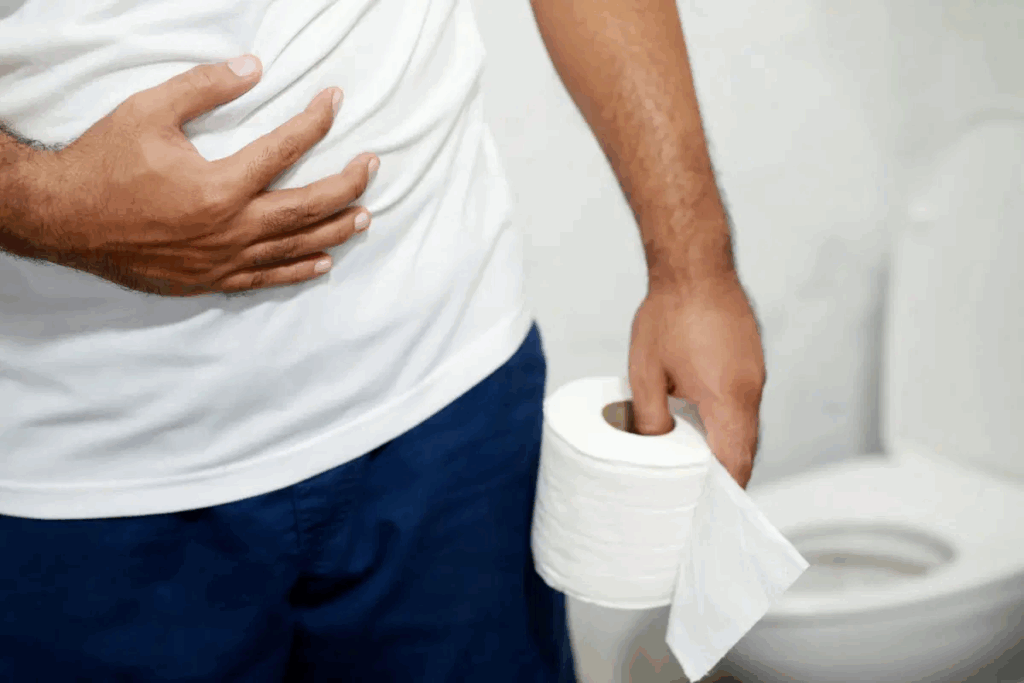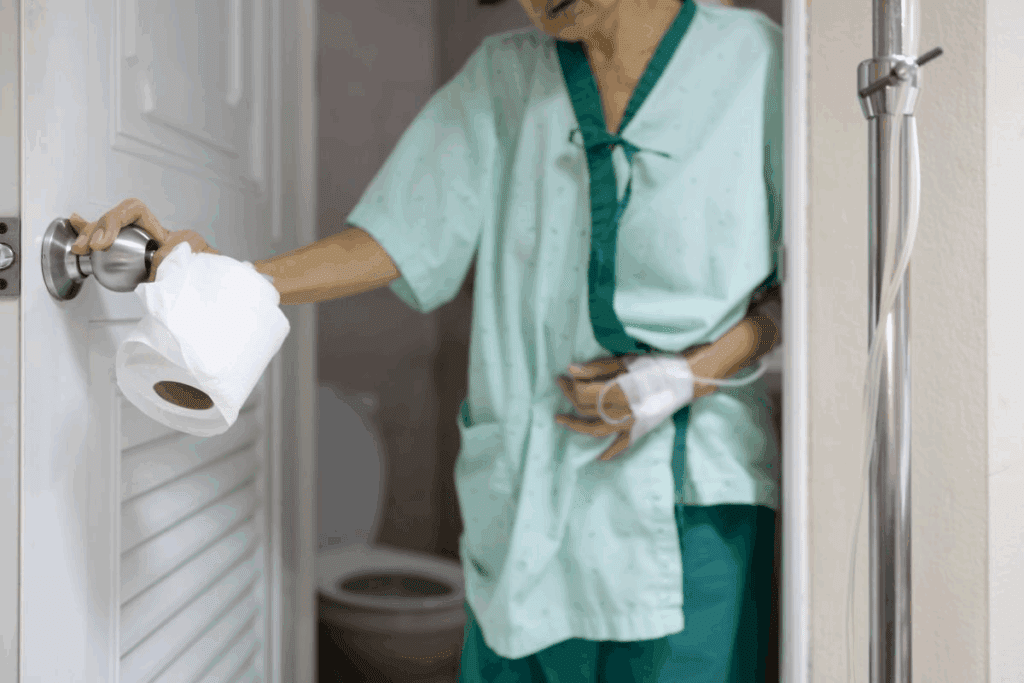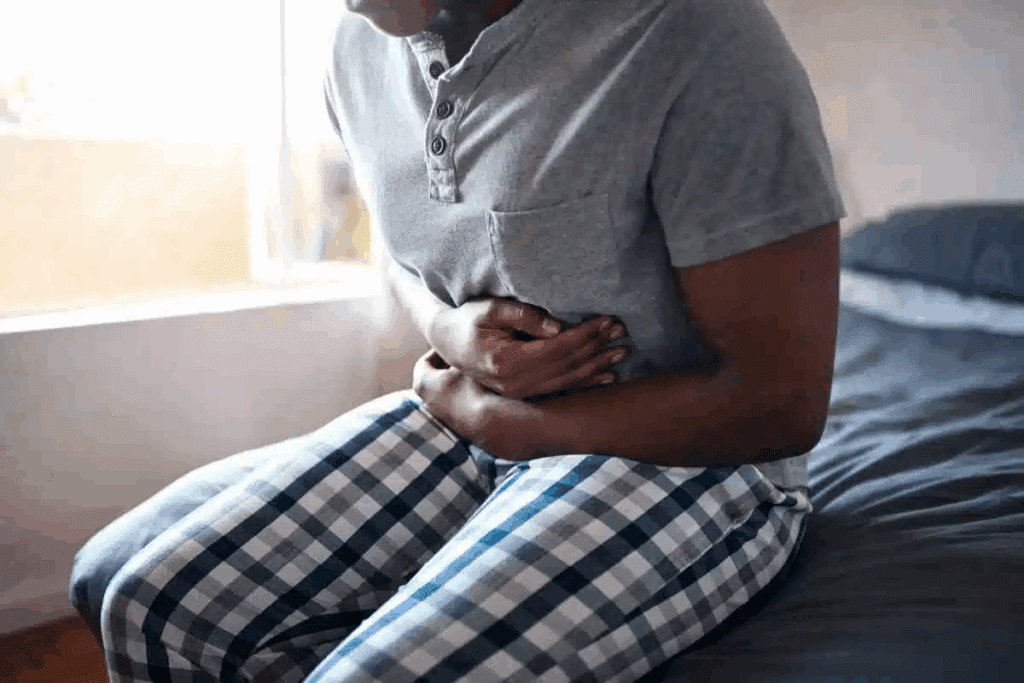
Recovery after colon resection surgery can be a complex process since colon resection, also known as colectomy, is a major procedure used to treat conditions like colorectal cancer, diverticulitis, and inflammatory bowel disease.
The recovery process is a journey with many stages. It’s shaped by the surgery, the patient, and care after surgery.
Knowing the stages of bowel resection surgery recovery helps patients. With new surgery methods and better care, healing is faster and less painful.

Colon resection surgery removes a part of the colon due to disease. It’s also known as colectomy or bowel resection. This surgery is a big deal and needs to be well understood.
There are many reasons for a colectomy. These include:
Knowing why you need a colectomy helps prepare for surgery and recovery.
The surgical method affects recovery. There are several colectomy types:
Each method has its own benefits and challenges. The choice depends on the patient’s health, the surgery reason, and the surgeon’s skill.
Colectomy types like right hemicolectomy, left hemicolectomy, sigmoid colectomy, and total colectomy vary based on disease extent and location.

A successful recovery starts long before surgery. It involves getting ready physically, emotionally, and setting up your home. This preparation is key for a smooth recovery after colon resection surgery.
Before surgery, several steps are important. You might need to stop taking some medications. Always follow your doctor’s advice on medications.
You’ll also need to fast before surgery. You might have to drink a special solution to clean your bowels. This is called bowel preparation.
The bowel preparation is a big step to avoid complications. Following the bowel preparation plan is critical for a good surgery outcome. It’s also a good idea to write down any questions or concerns for your doctor.
| Pre-Surgery Preparation | Description |
| Medication Management | Stop taking certain medications as advised by your doctor |
| Fasting | Avoid eating and drinking as instructed before surgery |
| Bowel Preparation | Drink a solution to clear your bowels |
Creating a good recovery space at home is essential. This means setting up a comfy area, getting the right supplies, and making your home safer. Make sure important things are easy to reach to avoid straining.
Mental preparation is as important as physical. Knowing what to expect and having realistic hopes can help with stress and anxiety. Try relaxation techniques like deep breathing or meditation. Connecting with support groups or counseling can also offer emotional support.
By preparing mentally and physically, patients can better face their recovery. This can make their experience better and possibly lead to better results.
The first stage after surgery is very important. It involves watching over the patient closely and managing their pain. This stage is the start of the recovery journey after colon surgery.
The first 24 to 48 hours are key. Patients are watched closely in the recovery room. They check vital signs and look for any problems.
They watch for respiratory or cardiac complications closely. They track blood pressure, heart rate, oxygen levels, and breathing rate.
| Vital Sign | Normal Range | Significance |
| Blood Pressure | 90/60 – 120/80 mmHg | Indicates cardiovascular stability |
| Heart Rate | 60-100 bpm | Reflects cardiac function |
| Oxygen Saturation | 95-100% | Shows adequacy of oxygenation |
Managing pain well is very important right after surgery. Doctors use different ways to help with pain, like medicine and other methods.
They might use opioids or other pain medicines. They also suggest breathing exercises or relaxation techniques to help with pain.
Keeping an eye on vital signs and looking for complications is important. Finding problems early helps doctors act fast.
Doctors watch for signs of trouble like infection or bleeding. Acting quickly can stop small problems from getting worse.
Getting up and moving early is key after colon surgery. It’s a critical part of getting better. This stage helps set the stage for a smooth recovery.
Moving around soon after surgery is important. This can lower the chance of blood clots and pneumonia. It also helps keep muscles strong and improves recovery.
Early movers often leave the hospital sooner and face fewer problems after surgery. Doctors help patients start moving as soon as it’s safe. They make a plan that fits each person’s needs.
ERAS protocols are guidelines for better surgical care. They focus on moving early, managing pain well, and eating soon. These rules help hospitals give more consistent care and improve results.
The time in the hospital after colon surgery varies. It depends on the surgery, the patient’s health, and any issues. Most stay 2-5 days. Robotic surgery might lead to quicker recovery times.
It’s important for patients to talk with their healthcare team. They should understand their recovery plan and what to expect in the hospital.
After colon resection surgery, the body starts to heal by getting back to normal. This stage includes important steps like bowel sounds coming back, the first bowel movement, and eating solid foods again.
Bowel sounds coming back is a sign that the gut is working again. This usually happens 3 to 4 days after surgery. Doctors listen with a stethoscope for these sounds, which shows progress.
The first bowel movement after surgery is a big deal. It means you’re getting back to normal bowel habits. It might take some time, and diet and medicine can affect it.
When bowel function comes back, you start eating solid foods again. This change should be made slowly, with doctor’s help. It’s important to make sure your gut can handle it.
| Recovery Milestone | Typical Timeframe | Key Considerations |
| Return of Bowel Sounds | 3-4 days post-surgery | Monitored by healthcare providers |
| First Bowel Movement | Variable, often within a week | Influenced by diet and medication |
| Transition to Solid Foods | Gradual, starting around 3-4 days | Guided by healthcare professionals |
Knowing these milestones helps patients and their caregivers understand the recovery better. It tells them what to expect and when to ask for help.
Leaving the hospital is a big step after colon resection surgery. It means your doctors think you’re ready to heal at home. This is a key moment in your recovery.
To go home, you must meet certain requirements. These include being able to use the bathroom, managing pain with pills, and not having serious problems. Your doctor will check these things before saying you’re ready to leave.
When you get home, you’ll get a lot of advice on how to take care of yourself. You’ll learn about wound care, what foods to eat, and how much to move around. It’s very important to follow these steps to heal well and avoid problems.
Key aspects of home care include:
It’s important to know when to call your doctor after you leave the hospital. Call them if you have bad stomach pain, a fever, can’t stop vomiting, or see signs of infection at the surgery site. Knowing when to ask for help can prevent bigger problems.
Your recovery journey is a process that requires patience, care, and attention to your body’s signals. By understanding the discharge criteria and following home care instructions, you can navigate this stage of your recovery with confidence.
Recovering at home after colon resection surgery needs careful attention. You must manage your wound, activities, and diet well. Knowing the right steps can help you recover smoothly and without complications.
Good wound care is key to avoid infection and help healing. Keep the surgical site clean by washing it gently with soap and water. Watch for signs of infection, like redness, swelling, pain, or discharge.
It’s important to balance rest and activity during recovery. Rest is key, but gradual mobilization helps prevent blood clots and aids healing.
| Activity | Recommended Timing |
| Light walking | Immediately after discharge |
| Moderate exercise (e.g., brisk walking) | 2-4 weeks post-surgery |
| Strenuous activities or heavy lifting | 6-8 weeks post-surgery |
Eating a balanced diet is important for recovery. Focus on nutrient-rich foods that are easy to digest. Drink plenty of fluids to stay hydrated.
By managing your wound care, activities, and diet well, you can improve your recovery after colon resection surgery.
After colon resection surgery, the physical rehabilitation stage is key for a full recovery. It helps patients regain strength, improve mobility, and enhance physical function.
Patients should start with light exercises like walking and then move to more challenging activities. This safe exercise progression prevents complications and aids in a smooth recovery.
Building core strength is vital for the body’s overall function and faster recovery. Patients can do exercises that strengthen the abdominal muscles without straining the surgical site.
Core strengthening exercises may include:
Physical therapists are essential in guiding patients through rehabilitation. They create personalized exercise plans, monitor progress, and offer support throughout recovery.
Working with a physical therapist helps patients:
By focusing on physical rehabilitation, patients can improve their recovery outcomes. They regain strength and mobility, and confidently return to their normal activities.
Recovering fully from colon resection surgery is more than just getting physically better. It also means dealing with the emotional and psychological effects of the surgery. As patients get stronger physically, they must also work on their emotional and mental health.
Recovery can bring many emotional challenges, like anxiety, depression, and mood swings. These feelings can come from the surgery itself, changes in how the body works, and worries about the future. It’s important for patients to recognize these feelings and ask for help when they need it.
Having support from loved ones, friends, and healthcare teams is key. Talking openly about feelings and concerns can help patients feel more in charge of their recovery.
Changes in body image can happen after colon resection surgery, like with a colostomy. Adjusting to these changes can be tough, both physically and emotionally. Patients might have to learn new ways to manage their bowel movements and get used to having a stoma.
Support groups and counseling are very helpful for those struggling with body image and adjusting to their new life. These places offer a safe space to share experiences and learn from others who have gone through similar surgeries.
Support groups, whether in-person or online, create a community where patients can find understanding and support. These groups offer practical advice on dealing with the psychological side of recovery and emotional support during tough times.
There are also many resources available to help with the psychological effects of colon resection surgery. These include counseling, educational materials, and online forums. By using these resources, patients can handle the psychological side of their recovery better.
After colon resection surgery, long-term recovery and follow-up care are key. They need careful monitoring and following medical advice. Patients must stay alert to their health and stick to the follow-up plan.
The recovery time varies based on health, surgery complexity, and complications. Most people take several months to a year or more to fully recover.
Regular check-ups are important to track recovery and catch issues early. These visits usually happen at 1-2 weeks, 1-2 months, 6 months, and 1 year post-surgery. The exact schedule depends on the patient’s needs and the doctor’s advice.
Follow-up care may include:
Diet is critical for long-term recovery. Patients should eat a balanced diet with fruits, veggies, whole grains, and lean proteins. Drinking plenty of water and avoiding foods that upset the stomach is also key.
Nutritional guidance may include:
Regular follow-ups are vital to catch any signs of surgery-related issues or recurrence. Patients should watch for unusual symptoms and report them to their doctor right away.
Signs that require immediate medical attention include:
By following the recommended follow-up schedule and staying alert to health changes, patients can greatly improve their recovery chances.
Knowing about possible problems after colon resection surgery is key for a smooth recovery. The surgery is usually safe, but knowing about risks helps patients and caregivers act fast to prevent them.
Like any big surgery, colon resection can have complications. Some common ones are:
Some things can make complications more likely after colon resection surgery. These include:
To lower the chance of complications, several steps can be taken:
By knowing about possible complications and taking steps to prevent them, patients can greatly improve their recovery after colon resection surgery.
Recovering from colon resection surgery is a complex journey. It needs careful management and follow-up. Knowing the colon resection surgery recovery process is key for a good outcome.
The colectomy recovery timeline differs for everyone. But with the right care, people can get back to their daily lives. It’s important to follow the advice of healthcare experts for a smooth bowel resection surgery recovery.
Those going through colon removal recovery should watch out for complications. Taking steps to avoid risks can help them recover well. This way, they can improve their life quality.
With the right care and follow-up, patients can beat the challenges of colon resection surgery. It’s vital to stick to the colectomy recovery timeline and get medical help if needed.
Recovery from colon resection surgery can take weeks to months. It goes through several stages. These include immediate recovery, early movement, and long-term healing.
Bowel resection surgery recovery can last from weeks to months. It involves managing pain, getting back to eating, and slowly increasing activity.
Early movement after colon surgery reduces risks and speeds healing. It also improves recovery. ERAS protocols, which include early movement, have shown better outcomes.
Managing pain includes medication and alternative methods. Work with your doctor to find the best plan for you.
Signs of complications include fever, pain, vomiting, and bleeding. If you notice these, contact your doctor right away.
Resuming activities varies based on health and surgery extent. Generally, it takes weeks to months to get back to normal.
You may start with a liquid diet and then move to solids. Avoid foods that cause discomfort. A personalized diet plan is key.
Keep the incision clean and watch for infection signs. Follow your doctor’s wound care instructions.
Long-term, avoid foods that cause discomfort and stay hydrated. A personalized diet plan is essential.
Regular follow-ups are important for monitoring recovery. The frequency depends on your needs and doctor’s advice.
Subscribe to our e-newsletter to stay informed about the latest innovations in the world of health and exclusive offers!